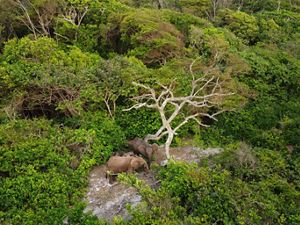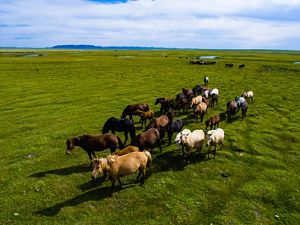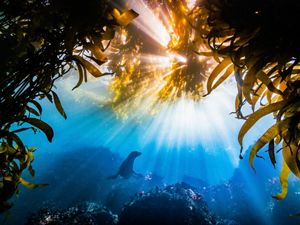Gabon and Mongolia Aim to Protect 380,000 Square Kilometers of New Land, Ocean and Freshwater Areas with The Nature Conservancy
Media Contacts
-
Angela Campbell
The Nature Conservancy
Email: angela.campbell@tnc.org -
Claire Griffin
The Nature Conservancy
Email: claire.griffin@tnc.org
As the United Nations Convention on Biological Diversity COP15 meeting continues, the nations of Gabon and Mongolia are stating their intent to lead the world on implementing the ambitious goal of protecting 30 percent of land, freshwater and ocean resources by 2030, in collaboration with The Nature Conservancy (which is the global affiliate of Nature United in Canada).
The combined impact of these commitments is expected to exceed 380,000 square kilometers of new land and ocean protected area – about the size of Japan – as well as significant efforts to protect freshwater resources and improve conservation management in collaboration with communities, to the benefit of local people as well as wildlife and its habitat. Both initiatives will use an approach called Project Finance for Permanence (PFP), which establishes a broad coalition to achieve conservation at a significant scale
“The world is facing unprecedented biodiversity loss," said Jennifer Morris, CEO of The Nature Conservancy, which is the global affiliate of Nature United in Canada “To reverse this loss by 2030 we must see more national governments investing in nature. Today, Gabon and Mongolia are working to develop PFPs as a powerful financial tool to protect their lands, ocean, and freshwater, address the biodiversity and climate crises together, invest in their communities, and meet international commitments.”
Both PFP efforts will move forward under the umbrella of Enduring Earth, an ambitious collaboration that works alongside nations as they accelerate and amplify conservation for a more sustainable, prosperous future for people and planet. Enduring Earth is comprised of The Nature Conservancy, The Pew Charitable Trusts, World Wildlife Fund (WWF), and ZOMALAB, the family office of Ben and Lucy Ana Walton.
The organizations that make up Enduring Earth have previously applied this approach with five nations (Costa Rica, Canada, Peru, Bhutan, Brazil), conserving more than 90 million hectares globally. Earlier this year, WWF announced a new PFP project in Colombia, the first to be completed under the Enduring Earth banner.
“The PFP model is a proven tool that has already protected over 100 million hectares of lands, ocean, and freshwater around the world. This approach can not only help meet, but also sustain the 30 by 30 goal, providing governments with a clear roadmap to achieve biodiversity, climate, and community development targets, and the resources to financially support them over time,” said Zdenka Pistulich, Director for Enduring Earth.
Leaders spoke to Gabon’s and Mongolia’s ambitions at a Thursday event where several nations further committed to the shared principles of resource mobilization for financing biodiversity. At least twenty-five countries have signed up to the 10 Point Plan, launched at the launched at the UN General Assembly in September. Led by Ecuador, Gabon, Maldives and the United Kingdom, the plan supports global efforts to promote the protection, restoration and sustainable use of nature and agreement of an ambitious post-2020 Global Biodiversity Framework at CBD COP15.
Later Thursday afternoon, the Government of Gabon and The Nature Conservancy will sign an agreement to collaborate on a broad conservation effort that will allow the country to meet its commitment to protecting 30 percent of lands, ocean and freshwater by 2030. Gabon is the first nation to make this triple commitment. The PFP is expected to protect more than 24,000 square kilometers of forestland, more than 8,000 square kilometers of ocean and 4,800 km of rivers. Improved forest management is expected to contribute the equivalent of 30 million tons of carbon mitigation annually.
“Gabon is leading the world in its efforts to reflect all natural systems in its biodiversity conservation, and along with the nation’s accomplishments in addressing climate change, this PFP will further cement Gabon’s leading position building an economy based on sustainable nature-based enterprises,” said Marie-Claire Paiz, Country Director for The Nature Conservancy in Gabon.
Tomorrow, leaders from Mongolia will join TNC and Enduring Earth to share the details of an agreement signed earlier this year, that expresses their commitment to conservation.
The initiative is expected to create 144,000 square kilometers of new protected areas and improve the management of 426,000 square kilometers of existing protected areas across the country. This effort would conserve a major swath of the world’s largest intact grasslands, as well as threatened peatlands that store carbon, boreal forests, free-flowing rivers and the habitat of critically endangered species including the snow leopard. Local herding communities, representing some of the last remaining nomadic cultures on Earth, are at the heart of this effort, and will continue to protect and manage their grasslands.
“Mongolia has long recognized the critical leadership of local communities in natural resource management and will continue to exemplify that collaborative approach in protecting and managing diverse natural areas,” said Gala Davaa, Country Director for The Nature Conservancy in Mongolia
Last week in Montreal, multiple First Nations leaders also announced their intention to use the PFP tool for four conservation projects, with an $800 million investment from the Canadian government and the support of the Enduring Earth collaboration.
Led by 17 First Nations, the Great Bear Sea initiative will build on the success of the first Project Finance for Permanence (PFP) model developed in 2007 to conserve the Great Bear Rainforest—a globally significant landscape of old-growth trees and freshwater systems. The First Nations-led vision for the Great Bear Sea initiative will expand the scope of conservation to vital marine ecosystems that have been stewarded by First Nations for millennia. The other three Indigenous-led PFPs that will receive federal support are the Omushkego Conservation Project in northern Ontario; the Qikiqtani Region of Nunavut; and the Northwest Territories.
The PFP projects supported by Enduring Earth under the leadership of The Nature Conservancy and the nations of Gabon and Mongolia would not be possible without philanthropic support from Bezos Earth Fund, Gordon and Betty Moore Foundation and Margaret A. Cargill Philanthropies.
The Nature Conservancy is a global conservation organization dedicated to conserving the lands and waters on which all life depends. Guided by science, we create innovative, on-the-ground solutions to our world’s toughest challenges so that nature and people can thrive together. We are tackling climate change, conserving lands, waters and oceans at an unprecedented scale, providing food and water sustainably and helping make cities more sustainable. Working in 76 countries and territories—37 by direct conservation impact and 39 through partners—we use a collaborative approach that engages local communities, governments, the private sector, and other partners. To learn more, visit www.nature.org or follow @nature_press and @enduring_earth on Twitter.
The Nature Conservancy is a global conservation organization dedicated to conserving the lands and waters on which all life depends. Guided by science, we create innovative, on-the-ground solutions to our world’s toughest challenges so that nature and people can thrive together. We are tackling climate change, conserving lands, waters and oceans at an unprecedented scale, providing food and water sustainably and helping make cities more sustainable. The Nature Conservancy is working to make a lasting difference around the world in 81 countries and territories (40 by direct conservation impact and 41 through partners) through a collaborative approach that engages local communities, governments, the private sector, and other partners. To learn more, visit nature.org or follow @nature_press on X.



